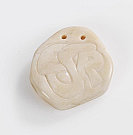
Caius Julius Caesar
0 v. Chr. Rom
Rom
The Roman statesman, general, and author Caius Julius Caesar was born on July 13, 100 B.C. in Rome as the son of a distinguished patrician family, the Gens Julia. From 80 to 70 B.C., Caesar was mainly in the east of the Roman Empire. Since he was unable to acquire a political office at that time, he studied rhetoric on Rhodes beginning in 73 B.C. Afterward, he returned to Rome and became a pontifex.
Caesar’s actual political career started in 68 B.C.: He was initially a quaestor beginning in 68 B.C., was appointed as a curule aedile in 65 B.C., and selected to be the Pontifex Maximus in 63 B.C. Furthermore, Caesar became a praetor in 62 B.C. and propraetor of the Iberian Peninsula in 61 B.C. He returned to Rome in 60 B.C.
After the reconciliation with Marcus Licinius Crassus (115 B.C. – 53 B.C.) and Pompeius (106 B.C. – 48 B.C.), Caesar formed the first triumvirate (three-man alliance; for the assertion of mutual interests) with them in 60 B.C. This was directed against the Senate oligarchy of Lucius Cornelius Sulla Felix (138 B.C. – 78 B.C.).
In 58 B.C., Caesar obtained the administration of the Gallia Cisalpina, Illyricum, and Gallia Narbonensis provinces through a special law as the proconsul. The Gallic Wars, in which Caeser subjected all of Gaul in victorious military campaigns, occurred during the years from 58 to 51 B.C. The description of this war was included in Caesar’s autobiographic work "Commentarii de bello Gallico". The document in seven books was published after the end of the term of office in Gaul and primarily served as justification for Caesar’s military campaigns to his numerous critics in the Roman Senate.
After the death of Crassus in 53 B.C., the triumvirate fell apart. Pompeius, who strove for autocracy, allied himself with the Senate and was elected as the sole consul in 52 B.C. However, Caesar succeeded in heading off the power intrigues against him through an invasion of Italy ("Crossing the Rubicon").
In the subsequent civil war, Caesar was victorious over Pompeius in the "Battle at Pharsalos" in 48 B.C. and over his followers in the following year. Caesar achieved control over all of Italy and is therefore the most powerful man in the Roman Empire.
With his innovations and intensive reform activities, he created preconditions for the unification of the Roman Empire. Caesar was elected consul in 48 B.C. and dictator for life in the following year.
On March 15, 44 B.C., Caesar became the victim of a conspiracy by the aristocracy under Marcus Iunius Brutus Caepio (85 B.C. – 42 B.C.) and Gaius Cassius (who died in 42 B.C.) and was killed during the Ides of March at the Pompeius Theater in Rome.

Would you like to sell a work by Caius Julius Caesar?
Infos for seller






